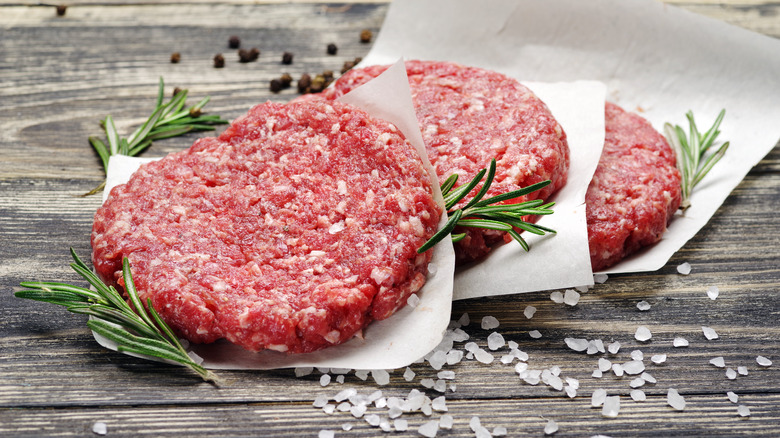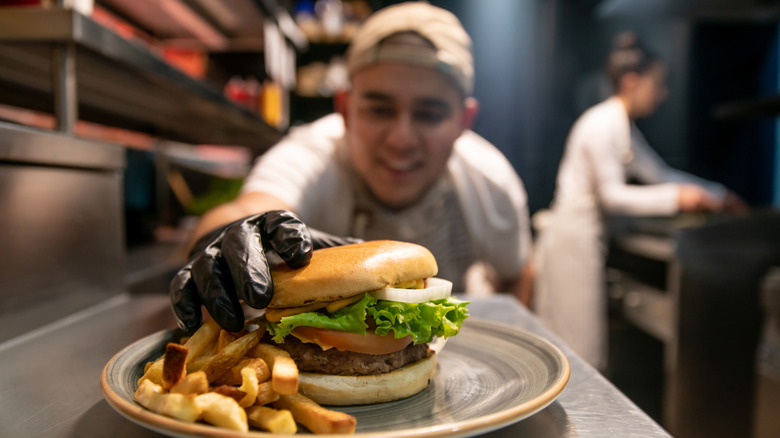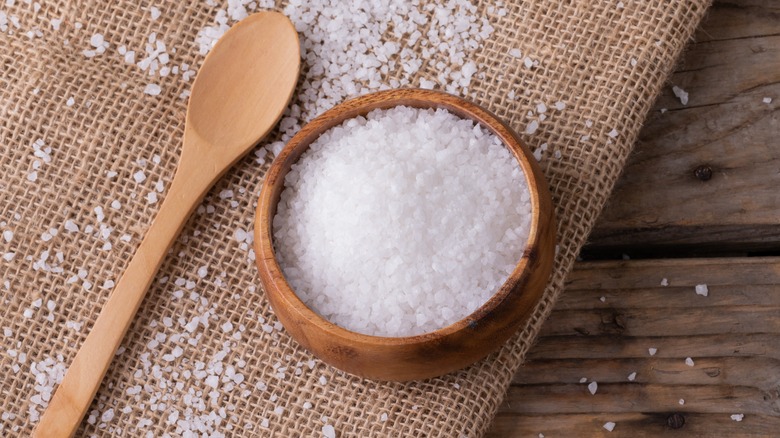Think Twice Before Adding Salt To Your Burger Mix
There's a universal love for the perfect burger, one that is juicy, tender, and bursting with flavor. As with any culinary creation, the quest for perfection often leads us to a myriad of cooking suggestions and techniques. Among these, you might've heard the advice of adding salt to your burger mix before forming the patties. However, this might not be the best strategy. Here's why.
When salt comes into contact with meat, it starts to break down its proteins, turning the stuff dry and compact. While this process is excellent for certain dishes like meatloaf, where a densely firm texture is desired, it's not ideal for burgers. Indeed, this chewy, sausage-like texture is far from the tender bite we associate with a good patty.
The right time to salt your burgers is just before you cook them. By waiting to season your patties until they're formed and ready to hit the grill or pan, you allow the salt to stay on the surface. This results in a beautiful, flavorful crust upon cooking, without affecting the burger's interior texture. It's a simple trick that can significantly elevate the taste and texture of your patties.
Other common mistakes when preparing a burger
Crafting the perfect burger goes beyond the simple interplay of meat and salt. There are other common burger mistakes that cooks frequently make when preparing their beloved burgers. One of the most common mistakes is overhandling the meat. When shaping your patties, it's important to handle the stuff as little as possible to prevent the fat from warming up and sticking together. An overworked patty can lead to a dense and tough burger.
Another common error lies in the uniformity of the burger. Believe it or not, shaping your patties uniformly can positively impact the overall cooking process. Patties that are uneven in thickness will cook unevenly, leading to an overcooked outer crust and an undercooked center. To avoid this, ensure your patty has a slight dimple in the middle, as this helps it retain a more uniform shape during cooking.
Lastly, forgetting to rest the burger after cooking is a common oversight. Just like a good steak, burgers need a few minutes to rest after they're cooked. This allows the juices to redistribute throughout the patty, yielding a juicier burger.
Adding salt to these other foods can be problematic
While salt is a fundamental part of seasoning and is crucial to drawing out the flavors in our food, it's not always beneficial when added too early — especially in certain types of dishes, similar to our burger mix. This leads to salt mistakes you may not realize you're making. Take beans, for instance. Adding salt to the cooking water too early can make the beans tough and prolong their cooking time. It's recommended to add salt only after the beans have been fully cooked to ensure they stay tender.
Likewise, when you're marinating certain proteins like chicken, salting too early could potentially dry out the meat. This is because salt extracts moisture, which can lead to a dryer end product. The best strategy is to salt right before cooking, similar to burgers, to ensure the meat remains juicy and flavorful.
In baking, especially with yeast-based doughs, salt can inhibit yeast's activity if directly combined. To avoid this, it's best to mix the yeast with the flour before adding the salt.


